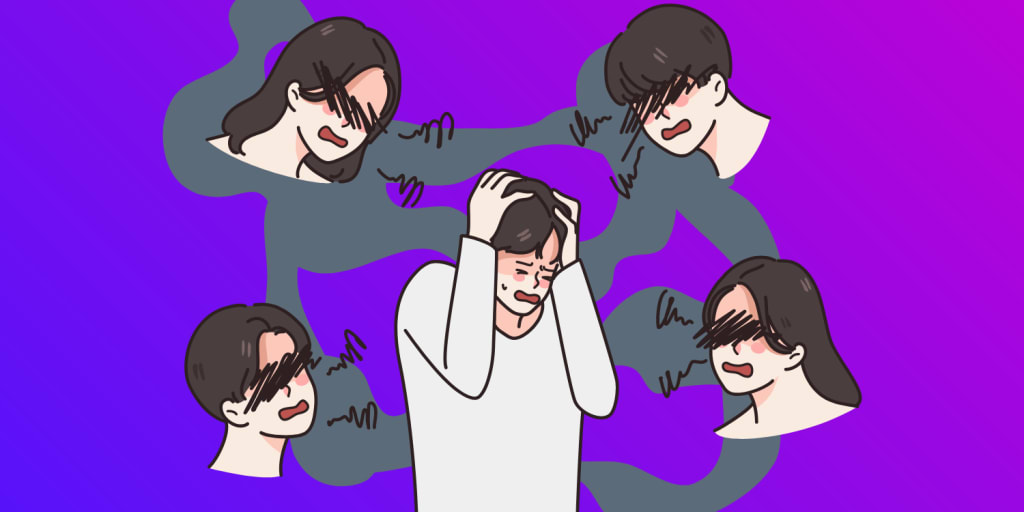The Feeling Of Not Doing Enough Is Your Loved One's Fault
The problem is you can't meet their impossible standards.

If you've been on any weight loss journey, like me, you will know the pressure, absurd nagging feeling of doing more.
Go to the gym more. Move more. Eat more vegetables. Eat more at home. Do more to lose more.
Sometimes you're the one telling yourself that. Abusing yourself in a way, whipping your inner child into submission. Do more. Do better. If you cared about your goal, you would do more. You know it's not a helpful cycle but when you're goal hunting, sometimes the inner critic takes over.
But something I've come to realise is that you're not always the one who has planted this "do more" attitude in your head.
Other times, it's your loved ones telling you to do more. And the negative cycle continues in your head as you echo their exact words. Do more.
I was quite lucky on my weight loss journey, an example of a goal I've worked through in recent years. My loved ones praised how much I was doing. They focused on what I had done rather than what else I could do.
But a friend of mine, Clare, wasn't so lucky. As she tried to lose weight, all she repeated was how much more she could be doing. And who put that idea in her head?
The ones who she thought cared about her.
Here are all the things they said and did to make me realise, sometimes it's not you, it's them.
Loved ones talk about them, not you
Instead of telling you how little you're doing, your loved ones focus on what they're doing. It's a transcript tactic, something you might see with Clare's experience I'm about to describe.
On paper (on a transcript), when Clare's best friend talked about everything she was doing to lose weight successfully, it looks like nothing.
Her best friend is speaking about herself. On paper, how is that offensive to Clare?
In reality, the best friend is only bringing her experiences to point out how little Clare is doing.
She is using comparison; Clare's doing nothing versus what she should be doing. Or what someone, her best friend, perceives she should be doing.
It's easy for anyone to interpret this as a backhanded insult, which, for most people, it is.
The worst part?
The people think they're giving you advice when they do this. Clare's friend felt upset when Clare called her out on it. The best friend thought by talking about herself she was being helpful. Yet, this is an example of unsolicited advice at its worst.
By the way, there is a difference between two people making conversation about their life and backhanded advice, which insults your effort.
Everyone does it. In my experience, I don't know anyone who hasn't started a sentence, "Well, when this happened to me…" It's not to change the topic. It's so you can give advice without sounding like you are.
Normalising loved ones
Ahh, normal.
One of my most loved and hated words. There really is no normal. There's socially typical behaviour; what most people do. But even then, normal, or typical, is a matter of opinion.
And your loved ones will use their opinion of normal to make sure you know you're not doing enough. They will use normal against you.
They will normalise a situation and remind you of all the ways you don't meet those standards.
Clare's mother always talked about what was the normal amount of weight one person should lose each week. Every time Clare didn't lose that amount, her mother would fain worry. "That's not normal," she would say. She would always say things like,
"This is how everyone else gets results",
"This works for most people",
Or "the consensus is…"
They were sweeping, generalised statements that referenced large, undefined groups of people. And poor Clare, she wasn't one of those "normal" people.
Predictive loved ones
When it comes to common goals, like losing weight, everyone is a genius. They all know how much weight you should lose and by what date.
They're like walking fitness apps. Good fitness apps, the ones that are actually correct.
I'm still looking for one of those, by the way.
So when someone tells us they are losing weight, we start doing the math. They should lose this much by this date.
It's poor math, by the way.
You don't have enough information about the person losing weight, or professional weight loss knowledge, to actually predict correctly. Yet, we do it anyway.
When Clare's mother started pointing out her weight loss due dates, and how she didn't make them, this wasn't unintentional. It was to demonstrate how "behind" Clare was. And how much more she needed to do to catch up.
It was another denormalising situation. She wasn't doing what she "should have" by now. She wasn't doing enough.
Perfect loved ones
And in the example of losing weight, a loved one saying you're not doing enough will be full of helpful suggestions. They will have the perfect tools you don't apparently know about. They will point out:
- Gyms nearby to you
- Weight loss programs you might not have heard of
- Doctors who specialise in weight loss
- A documentary to watch on weight loss
Clare's father did this to her all the time. On Valentines Day, he bought her a weight loss book. All the other women in the family received beautiful boxes of chocolate.
On a basic level, Clare's father was behaving like an asshole. But deep down, he could justify his intentions as helping his daughter.
- It would be cruel to give someone losing weight chocolates.
- It would be cruel to walk past that book and not give it to someone trying to lose weight.
Justified insults, or those made with good intentions, are still insults. And they continue to be demotivators no matter which way you look at it.
Are you doing enough?
Now, this wasn't a weight loss article.
It was an example of reaching your goals. Most goals are fundamentally the same.
Weight loss, my example, isn't anything special. You find something you want to improve about your life. You take the steps towards achieving that goal.
You face wins. You face losses. And after staying true to the process, you eventually reach that goal.
I've oversimplified it. But having a goal isn't special. We're all chasing something. And we all have enough doubt, concern and demotivation within ourselves to put us off course.
We don't need our loved ones reminding us, along the way, that we could be doing more.
We know the reality. You could always be doing more to reach your goal. You could always stay longer in the gym. Work an extra hour at your desk. Save more money and sacrifice another luxury.
Here's the problem with that reality; where does it end?
Your loved ones don't think about the end when they're saying all these things to you.
- They don't see how at capacity you already are.
- They don't always see what you are doing when they aren't there.
- They see the fact you haven't hit your goal like the glass is half empty.
The people who do this won't change. In Clare's experience, right until she hit her weight loss goal, she heard the same thing. Now she's at her weight target, people keep reminding her not to go backwards.
People are never satisfied.
From me to you, find people who are glass half full people. Surround yourself with those who celebrate what you're doing, or have done. And get rid of those who point out the gaps in your life.
Their pessimistic attitude isn't getting you to your goal any faster.
And you deserve better.
About the Creator
Ellen "Jelly" McRae
I’m here to use my wins and losses in #relationships as your cautionary tale | Writes 1LD; Cautionary tale #romance fiction | http://www.ellenjellymcrae.com/






Comments
There are no comments for this story
Be the first to respond and start the conversation.